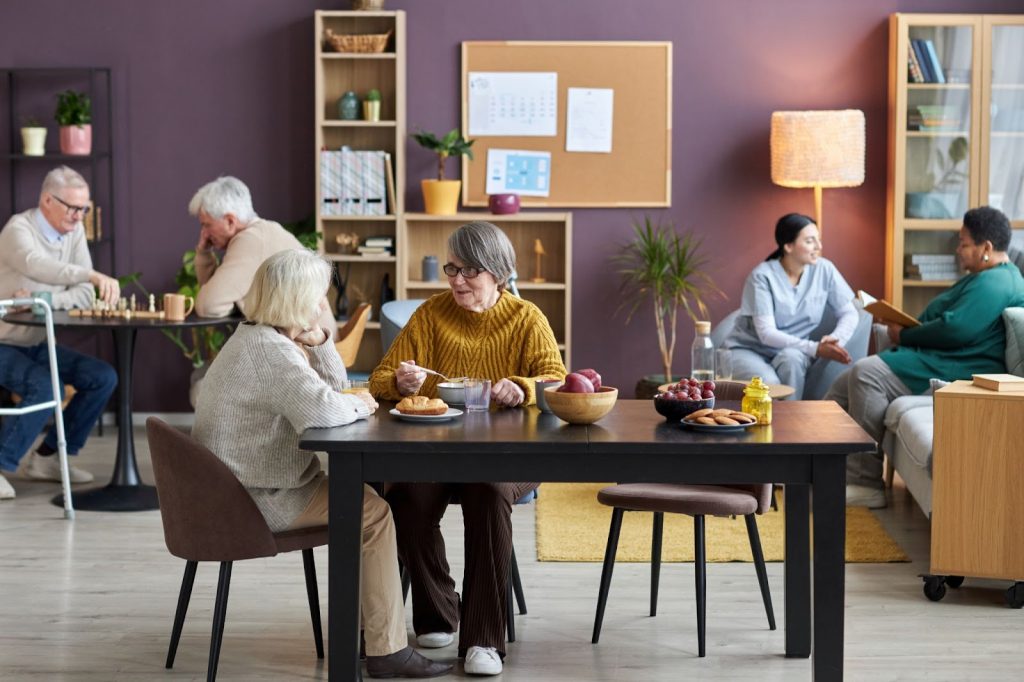Caring for a loved one can be a rewarding experience, but it can also come with challenges – and sometimes, that means it’s time for assisted living. As time passes, you may notice signs indicating the need for additional support and care that surpasses what can be provided at home.
In this blog post, we will examine how assisted living facilities can address nutritional concerns, provide a supportive environment, and alleviate the strain on caregivers, among other things.
By recognizing these signs and understanding the advantages of assisted living, you can make informed decisions about the well-being and quality of life of your loved one. Without further ado, let’s look at ten signs that it might be time for an assisted living facility.
1. Your loved one is struggling with activities of daily living.
Struggling with ADLs is a deeply personal and challenging experience. When individuals face difficulties with basic tasks like bathing, dressing, eating, toileting, transferring, and maintaining continence, it can be a sign that additional support is needed in their daily lives.
It’s important to remember that these struggles often indicate a decline in functional abilities and a diminishing capacity for essential self-care tasks. They can jeopardize an individual’s well-being, safety, and overall quality of life.
Recognizing the signs of struggling with ADLs is an opportunity to provide the necessary support and care for our loved ones.
2. Your loved one is experiencing a decline in physical health.
When a loved one’s physical health begins to decline, it can be a cause for concern, as this can impact many aspects of their life, including their ability to manage daily tasks and maintain independence.
This decline can manifest in different ways, such as mobility challenges, chronic illness, and other age-related health problems. Assisted living facilities are designed to provide compassionate care for seniors with physical health issues.
3. You are concerned about your loved one’s safety.
When we start thinking about the safety of our loved ones, it’s a sign that they may need extra help.
This concern may arise if they struggle with daily activities, mobility, or memory, putting them at risk of accidents or injury. When this happens, it’s time to consider assisted living, where our loved ones can receive the care and support they need to stay safe.
Assisted living facilities have safety features like handrails, grab bars, and non-slip floors, which can reduce the risk of accidents and injuries. The living spaces are designed with accessibility and safety in mind so seniors with mobility issues can move around safely and comfortably.
Assisted living communities also offer 24-hour staffing and on-site emergency response systems, which can provide peace of mind to both seniors and their loved ones.
4. Your loved one feels isolated and lonely.
Feelings of isolation and loneliness are often experienced by seniors who live alone or have lost loved ones, which can negatively impact their overall health and well-being.
These feelings indicate that it’s time to consider assisted living, where seniors can benefit from social engagement with peers and compassionate care from professionals who can help improve their quality of life.
Assisted living facilities offer opportunities for socialization and engagement with other seniors, which can help combat feelings of loneliness and isolation.
These living communities provide seniors with various activities, such as games, arts and crafts, movie nights, and group outings. This can benefit seniors who may have difficulty getting out and maintaining social connections on their own.
5. Your loved one is experiencing a decline in cognitive abilities.
A decline in cognitive skills can indicate that it’s time to consider assisted living for your loved one.
Cognitive decline can manifest in various ways, such as memory loss, difficulty with decision-making, decreased problem-solving skills, and confusion. These changes can impact a person’s ability to safely manage daily activities, leading to increased vulnerability and safety risks.
Assisted living facilities are equipped to support individuals with cognitive decline. These facilities have staff trained to understand and help manage the unique challenges of memory loss and cognitive decline. They can provide the necessary support to ensure your loved one’s safety and well-being.
6. Your loved one can longer maintain their home.
The inability to effectively manage household tasks can indicate a decline in physical health, mobility, or cognitive abilities, making it challenging for them to live independently and maintain a safe and comfortable living environment.
Assisted living facilities can provide the support your loved one needs to ensure their living space is clean, well-maintained, and safe. Trained staff can assist with housekeeping duties such as cleaning, laundry, and maintaining their living quarters’ overall cleanliness and tidiness. This can help relieve your loved one of these tasks’ burdens and physical strain.
In addition to housekeeping support, assisted living facilities can also help with home maintenance tasks. This can include basic repairs, upkeep, and ensuring that the living space is well-functioning and free of hazards. By addressing these maintenance needs, assisted living can help create a safe and secure environment for your loved one.
7. Your loved one has dealt with medication mismanagement.
Medication mismanagement is a problem that can occur when a person has difficulty managing their medications. This may happen due to physical or cognitive decline, affecting their ability to remember to take medications on schedule or in the correct dosage.
Medication mismanagement can lead to serious health consequences, including adverse reactions, hospitalization, or even death.
One of the signs that it’s time for assisted living is the inability to manage medications effectively. Assisted living facilities have trained staff to manage medication, ensuring medications are taken correctly and at the right time. This can be especially critical for seniors who are taking multiple medications or complex medication regimens.
A regimen is a routine of medication that follows a specific schedule for administration. In some cases, seniors may need assistance organizing their medications to ensure they are taken correctly and at the right time.
In an assisted living facility, staff members can help ensure that medications are correctly organized and that the individual takes them as prescribed.
Medication management services offered at assisted living facilities can include medication order monitoring, medication administration, and coordination of prescription refills.
This can help relieve the responsibility of keeping track of medications from the individual, ensuring that they receive the right medicines at the right time and allowing them to focus on other aspects of their life.
8. Your loved one feels strained financially.
Feeling financially strained can indicate that it’s time to consider assisted living for your loved one. Assisted living facilities typically have a clear and transparent pricing structure that includes various services and amenities.
By moving to an assisted living facility, your loved one can better understand their monthly expenses, allowing them to budget more effectively and alleviate financial strain.
9. Your loved one’s nutritional health is declining.
Assisted living facilities can provide the necessary support and resources to help seniors maintain a healthy and balanced diet, which is crucial for their overall well-being.
Assisted living can help with meal planning and preparation, provide a social dining environment, supervise eating habits, cater to special dietary needs and restrictions, and provide nutritional education and counseling.
10. You’re experiencing caregiver burnout.
Caregiver burnout refers to a state of physical, mental, and emotional exhaustion that occurs when caregivers are overwhelmed by the demands of caregiving. Signs of burnout include:
- Physical and mental exhaustion.
- A decline in your own health and well-being.
- Feelings of anger, irritability, and resentment.
- Social withdrawal and isolation.
- Difficulty managing your loved one’s care needs.
Experiencing caregiver burnout is a sign that the stress and demands of caregiving may be too overwhelming to manage independently at home.
Assisted living facilities can provide the necessary support, resources, and a safe environment for your loved one, offering professional care and assistance while alleviating the burden on you as the caregiver.

Assisted Living at Country Pines in Clinton, Utah
If you’ve noticed one or more signs indicating the need for assisted living for your loved one, it’s essential to take the next step and explore the options available. Even if you don’t move your loved one to an assisted living facility right away, exploring your options and preparing for the possibility is still important.
Choosing the right assisted living facility can be challenging! After all, you want only the best care for your loved one.
We invite you to schedule a tour of Country Pines and see firsthand how we prioritize our residents’ health, well-being, and happiness. Our compassionate staff, nutritious meals, and engaging activities are designed to ensure a comfortable and fulfilling lifestyle for every individual.
Don’t wait; take action today to provide your loved one with the support they need. Contact Country Pines and embark on a journey towards a better quality of life.

